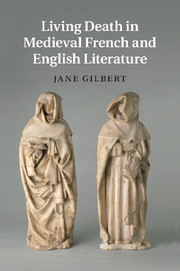Book contents
- Frontmatter
- Contents
- Acknowledgements
- Note on translations
- Introduction: living death
- 1 Roland and the second death
- 2 The knight as Thing: courtly love in the non-cyclic prose Lancelot
- 3 The ubi sunt topos in Middle French: sad stories of the death of kings
- 4 Ceci n'est pas une marguerite: anamorphosis in Pearl
- 5 Becoming woman in Chaucer: on ne naît pas femme, on le devient en mourant
- Conclusion: living dead or dead-in-life?
- Notes
- Bibliography
- Index
- Cambridge Studies in Medieval Literature
3 - The ubi sunt topos in Middle French: sad stories of the death of kings
Published online by Cambridge University Press: 01 March 2011
- Frontmatter
- Contents
- Acknowledgements
- Note on translations
- Introduction: living death
- 1 Roland and the second death
- 2 The knight as Thing: courtly love in the non-cyclic prose Lancelot
- 3 The ubi sunt topos in Middle French: sad stories of the death of kings
- 4 Ceci n'est pas une marguerite: anamorphosis in Pearl
- 5 Becoming woman in Chaucer: on ne naît pas femme, on le devient en mourant
- Conclusion: living dead or dead-in-life?
- Notes
- Bibliography
- Index
- Cambridge Studies in Medieval Literature
Summary
Within medieval Christianity, accepting that one had to die was an ethical and spiritual imperative involving realigning one's priorities towards God and eternity and away from earthly reality and the worldly pursuit of ease, wealth and power. A substantial effort was therefore poured into persuading and enabling subjects to acknowledge what Ariès calls ‘the death of the self’ (as opposed to ‘the death of the other’). Medieval texts, like modern theorists, recognize certain challenges in the project of contemplating mortality. One is the difficulty of imagining one's own death. Thus in Guillaume de Deguileville's influential fourteenth-century dream vision, the Pèlerinage de vie humaine (first redaction, 1330–1), when Death arrives the narrator-Pilgrim wakes, bringing to an end both narrative and poem:
La Mort laissa sa faus courir
Et fist m'ame du cors partir,
Ce me sembla si com songoie.
Mais ainsi comme je estoie
En tel point et en tel tourment
J'oui l'orloge de convent
Qui pour les matines sonnoit
Si comme de constume estoit.
Quant je l'oui, je m'esveillai
Et tout tressuant me trouvai,
Et pour mon songe fu pensis
Mont grandement et esbahis.
(Death let her scythe swing and made my soul leave my body, so it seemed to me as I dreamt. But just as I was in this circumstance and in this torment, I heard the abbey bell ringing for matins, as it normally did. When I heard it I awoke and found myself all in a sweat, and because of my dream I was most perplexed and astounded.)
- Type
- Chapter
- Information
- Living Death in Medieval French and English Literature , pp. 103 - 150Publisher: Cambridge University PressPrint publication year: 2011

